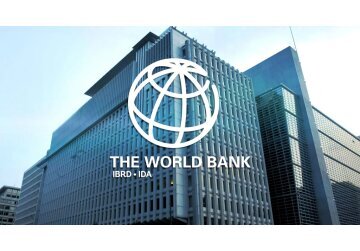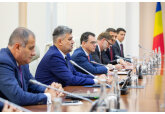
Moldova will receive $40 million (37.4 million euros) from the WB to implement the Disaster Risk Management and Resilience Support Project
This is stipulated by a relevant loan agreement between Moldova and the International Bank for Reconstruction and Development (member of the World Bank Group) for the implementation of the above-mentioned project, the signing of which was approved by the government. Finance Minister Victoria Belous was authorized to sign this document. The Cabinet said that on September 5, the WB's Board of Directors approved a financing package worth $40 million (the equivalent of 37.4 million euros) for the project “Strengthening Moldova’s Disaster Risk Management and Resilience”, which is aimed at improving Moldova's preparedness and response to natural disasters and climate change-related shocks that threaten lives, homes and critical infrastructure, as well as, in case of such a crisis or emergency, a quick and efficient response to them. The draft proposed agreement has 5 components: ‘Investment and Institutional Strengthening for Emergency Preparedness and Response,’ $29.5 million; ‘Hydrometeorological Service Improvements,’ $6.5 million; ‘Policy and Regulatory Support for Critical Infrastructure Risk Mitigation and Financial Resilience,’ $2.5 million; ‘Project Management,’ $1.5 million; and ‘Emergency Response,’ $0 million. This component would reallocate loan funds from the other components to provide immediate recovery and reconstruction support in the event of a crisis, depending on the situation. The $40 million (37.4 million euros) loan will be disbursed to Moldova for 30 years with a 5-year repayment vacation. The loan is to be repaid semi-annually and the interest rate will be floating (Euribor 6 month plus a margin set quarterly by the bank). The commitment fee is 0.25%, calculated on the amount outstanding, and the one-time fee will be 0.25% and calculated on the loan amount. The loan servicing costs are to be paid from the state budget. According to the government, under the conditions when Moldova is facing a financing deficit, it is important to attract financial resources for disaster risk management. Thus, the project will contribute to savings by preventing losses and damages, which will bring direct economic benefits. At the same time, strategies will be implemented to minimize the financial impact of risks, including policy reforms and investments in protective infrastructure. The project takes a comprehensive approach to strengthening disaster risk management capacity in Moldova through 3 components: installation and implementation of a national public alert system based on mobile electronic communication; improvement of Moldova's meteorological and hydrological service; and alignment of national seismic design and retrofitting standards with EU building standards, especially with regard to earthquake resistance. In particular, a national public alert system based on mobile electronic communication, being integrated with existing meteorological, hydrological and geological information systems, will significantly improve the country's preparedness to deal with natural disasters such as floods, fires and earthquakes. The project will also support the procurement of emergency response vehicles and equipment, such as fire engines and specialized equipment for search and rescue and logistics operations, which will strengthen the capacity of emergency services at the national and local levels. In terms of improving Moldova's meteorological and hydrological services, the project aims to support strengthening of the country's meteorological forecasting capacity and modernization of the early warning system, which will improve decision making for decision makers, enterprises and farmers who are increasingly affected by drought. The hydrometeorological service will become more efficient: the hydrometeorological observation systems will be modernized, the forecasting capabilities of the State Hydrometeorological Service will be improved and institutional and regional cooperation in this segment will be strengthened. At the same time, a component such as harmonization of national standards for seismic design and retrofitting with EU building standards, especially earthquake resistance standards, includes development of national methodologies for seismic and disaster risk mapping, as well as rapid visual inspection of buildings based on characteristics related to seismic vulnerability. The project will also help replenish the Disaster Reserve Fund to provide transparent and rules-based funding to respond to severe weather events, the severity and frequency of which will increase in the future as a result of climate change. “Extreme weather events affect the whole world, including Moldova. We cannot avoid them, but we can be better prepared to effectively manage them and minimize their impacts. The project will allow institutions to be ready to respond quickly to emergencies and will establish new rules to reduce risks at the level of critical infrastructure,” said Interior Minister Adrian Efros. As Inguna Dobraja, Country Director of the World Bank Group in Moldova, noted earlier, Moldova is among the most climate vulnerable countries in Europe. Since 2000, our country has experienced significant natural disasters or natural hazards on average once every 3 years. “Improving Moldova's emergency preparedness and response capabilities is essential to protect human life and prevent economic losses caused by climate change-induced disasters,” she said. “Strengthening Moldova’s Disaster Risk Management and Resilience” project will be co-financed by grant funds provided by the Global Facility for Disaster Reduction and Recovery (FGRRD) and the Technical Assistance Financing Facility for Disaster Prevention and Preparedness (TAFF) in the Europe and Central Asia Region, funded by the Directorate-General for European Civil Protection and Humanitarian Aid Operations (EU DG ECHO). // 09.10.2024 – InfoMarket







